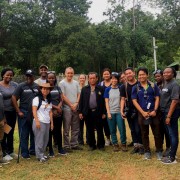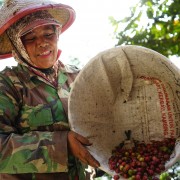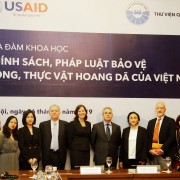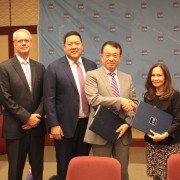Speeches Shim

This week in Thailand, journalists from Tanzania joined forces with their Thai counterparts to explore wildlife conservation and trafficking issues. The trip was part of a two-way exchange. In June, Thai journalists traveled to Tanzania to learn about wildlife trafficking from a source country perspective. The Thai side of the exchange focuses on issues related to the demand for illegal wildlife products.

The United States Agency for International Development (USAID), through its Green Invest Asia project, the Philippine Coffee Board, and International Women’s Coffee Alliance in the Philippines are organizing a one-day networking event in Manila at the Dusit Thani Hotel on August 29th for an expected 60 coffee producers, buyers, and capital providers to discuss how Southeast Asia’s coffee markets are adapting to, and capitalizing on, shifting preferences worldwide to sustainable coffee.

The U.S. Agency for International Development (USAID), through the USAID Wildlife Asia activity, in partnership with the Office of the National Assembly, brought together top government leaders and relevant stakeholders today for a featured dialogue aimed at evaluating the country’s communication work on endangered species conservation. The high-level event reflects a deliberative process to put forward concerted demand reduction efforts that will bring an end to the consumption of illegal wildlife products in Vietnam.

The U.S. Agency for International Development (USAID) launched a partnership with the Asian Development Bank (ADB) to accelerate the transition to a sustainable, secure, and market-driven energy sector in Asia. USAID Asia Bureau Acting Assistant Administrator Gloria Steele and Director General of ADB’s Strategy, Policy, and Review Department, Tomoyuki Kimura signed the partnership agreement at the Asia Clean Energy Forum (ACEF).
Advances in science and innovative service delivery models have made it possible to end the AIDS epidemic by increasing access to HIV testing and antiretroviral medications, thereby preventing new infections among individuals at greatest risk. In many countries across Asia and the Pacific, the highest proportion of new HIV infections each year occurs among transgender women and men who have sex with men (MSM), yet the number of people in these populations accessing HIV services remains very low. With funding from the U.S. President’s Emergency Plan for AIDS Relief (PEPFAR), the U.S. Agency for International Development Regional Development Mission for Asia (USAID/RDMA) works to control the epidemic by using more effective methods to reach, test, treat and retain MSM and transgender women in clinical services. The PEPFAR Incentive Fund to Thailand has facilitated increased domestic financing to community-based services, forging stronger partnerships in the HIV response between the Royal Thai Government and civil society institutions. This has also supported a regional technical platform for connecting and sharing practices with other countries to enhance HIV programming for key populations.

Comment
Make a general inquiry or suggest an improvement.